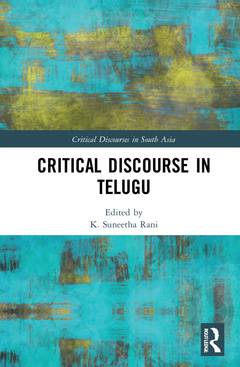Critical Discourse in Telugu Critical Discourses in South Asia Series
Coordonnateur : Rani K. Suneetha

This volume forms a part of the Critical Discourses in South Asia series which deals with schools, movements and discursive practices in major South Asian languages. It offers crucial insights into the making of Telugu literature and its critical tradition across over a century. The book brings together English translation of major writings of influential figures dealing with literary criticism and theory, aesthetic and performative traditions, re-interpretations of primary concepts, categories and interactions in Telugu. It presents 32 key texts in literary and cultural studies representing thoughts, debates, signposts and interfaces on important trends in critical discourse in the Telugu region from the middle of the 19th to the end of the 20th century, with nearly all translated by experts for the first time into English. The volume covers a wide array of themes, ranging from a text by Kandukuri Veeresalingam on women?s education to Challapalli Swaroopa Rani on new readings of the oral literature of the marginalised communities. These radical essays explore the interconnectedness of the socio-cultural and historical developments in the colonial and post-independence period in the Telugu region. They discuss themes such as integrative aesthetic visions; poetic and literary forms; modernism; imagination; power structures and social struggles; ideological values; cultural renovations; and collaborations and subversions.
Comprehensive and authoritative, this volume offers an overview of the history of critical thought in Telugu literature in South Asia. It will be essential for scholars and researchers of Telugu language and literature, literary criticism, literary theory, comparative literature, Indian literature, cultural studies, art and aesthetics, performance studies, history, sociology, regional studies and South Asian studies. It will also interest the Telugu-speaking diaspora and those working on the intellectual history of Telugu and conservation of languages and culture.
1. Women’s Education [February 1875] 2. Prologue to A Memorandum on Modern Telugu 3. Prologue to Radhika Santvanamu 4. Foreword to History of Telugu Literature 5. The Harm Caused to Telugu 6. The Sitamma Tikkanna Sculpted 7. Introduction to Musalamma Maranamu 8. Man and Woman (Excluding the Aspect of Love) 9. Freedom of the Artist 10. Purpose of Poetry 11. The Structure of Poetic Revolutions 12. Those Six Poets 13. Why Sanskrit, Oh Swami? 14. The Word is the World 15. The Story of Rama and the Class Character 16. First Generation Short Stories of Telangana 17. The Origins of Telugu Drama That One Does Not Wish to See 18. Literary Criticism, too, is Social Praxis 19. Music That’s Snapping Its Shackles 20. Protest against the Caste Hegemony 21. Literature and its Philosophical Premise 22. The Trajectories of Kalingandhra Story 23. Rasa and Women’s Experience 24. Why has Madhuravani Changed? 25. Reflections on Marxist Literary Criticism in Telugu 26. Coarse Winnows that Sift Literature 27. Difference of Perspectives between Dalit Literature and Revolutionary Literature 28. The Furnace 29. A Garden of Mirrors: Reclaiming the Sufi Past and Contemporary Muslim Discourse 30. Poetry is but the Reflection of Realistic Identities 31. Muslim Women’s Poetry 32. The Story of Yellamma: The Philosophical Perspective
K. Suneetha Rani is Professor at the Centre for Women’s Studies, University of Hyderabad, India. She taught at the Department of English, Women's University, Tirupati and the Department of English, University of Hyderabad, before joining the Centre for Women's Studies in 2011. Her areas of interest include gender studies, cultural studies, comparative studies, new literatures in English and translation studies. She translates from Telugu to English and vice versa. She has extensively published research articles and translations in English and Telugu. Her major publications in English include Australian Aboriginal Women’s Autobiographies: A Critical Study (2006); Flowering from the Soil: Dalit Women’s Writing from Telugu (translation of Dalit women’s select writings from Telugu, 2012); English in the Dalit Context (co-editor, 2014); Vibhinna: Voices from Contemporary Telugu Writing (co-editor, 2015); A House on the Outskirts and Other Stories (translation of Devarakonda Balagangadhara Tilak’s select short fiction from Telugu, 2016); Influence of English on Indian Women Writers: Voices from the Regional Languages (2017); Identities and Assertions: Dalit Women’s Narratives (2017);and The Rock That Was Not (translation of Githanjali’s select short fiction from Telugu, 2019).
Date de parution : 09-2023
15.6x23.4 cm
Date de parution : 11-2021
15.6x23.4 cm
Thèmes de Critical Discourse in Telugu :
Mots-clés :
language; literature; Telugu; regional; critical discourse; ideologies; movements; subversions; modernity; mobility; identities; Telugu Literary; transformation; Holds; Dalit Literature; Dalit Movement; Dalit Women; Wo; Follow; People’s Language; Ambedkar; Vemana; Telugu Poets; Dalit Writers; Telangana Movement; Dalit Poetry; Dalit Women Writers; Dense; Telugu People; Violated; Waterfall; Short Story Writer; Young Men; Andhra Pradesh; Ramarao; Sthayi Bhava; Modern Telugu



